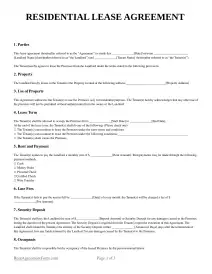
Even if you are renting to friends or family members, disputes sometimes can arise between both parties. A rent agreement form can minimize the chance of any conflicts by having a written, signed contract.
This page provides an overview of this valuable legal protection, including a look at the lease agreement forms by state and how the leasing process works.

A standard residential lease agreement is a contract between a landlord and a tenant for the rental of residential property. The document covers a fixed term, typically one year. It can be used for any livable property, including single-family homes, apartments, condominiums, mobile homes, and room rentals.
After having their rental application approved, this agreement will be drawn up. After both parties sign the agreement, they are bound by its terms until the end of the rental period. The tenant then must pay the first month's rent and any required deposits after signing this legal document.
A standard residential lease agreement should contain the following components:
Although laws regarding security deposits and disclosures may vary from state to state, the leasing process follows similar steps throughout the nation. Here are the steps a landlord takes before signing a lease agreement with a tenant.



It is very important for tenants to read all the information in a lease agreement and to ask any questions they might have. After the landlord and tenant have discussed and agreed on the terms of the contract, they are ready to sign a lease agreement. In most circumstances, it is not necessary to have a notary public as a witness to the signing. All adults living on the property, as well as the property manager or landlord, should sign the lease. If a co-signer is part of the agreement, they need to sign also.

After the lease agreement has been signed by all parties, the landlord will request the rental and security deposit payments outlined in the contract. It is typical for a landlord to wait until these payments have cleared before giving the tenant access to the property. If the payments have cleared and the date of the contract has arrived, the landlord will give the tenant the keys and anything else they need to gain access to the property. In other words, the tenant will be able to move into their new home.

The laws governing the landlord-tenant relationship -- including everything from security deposit limits to how much notice a landlord must give to enter a property, can vary widely state by state. Therefore, it is essential to know the laws that apply to where you live. For example, 24 states place no restrictions on the amounts landlords may charge for security deposits. On the other end of the spectrum, 10 states (including Delaware and Nebraska) limit the security deposit to the same amount as one month's rent. Advance notice of rent increases is another variable. Landlords in Georgia, Vermont, and Delaware must give a 60-day notice of a rent increase for month-to-month contracts. However, landlords in Maine, Hawaii, and Nevada need only provide a 30-day notice.
Some addendums and disclosures are required by state law, and, as such, they may vary from state to state. For example, California law requires landlords to notify tenants of possible exposure to certain chemicals. Here is a table that lists state rules for addendums and disclosures.
A security deposit is an amount of money collected by the landlord to cover losses that may occur if the tenant fails to pay rent or leaves damage to the rental property at the end of their lease term.
Each state sets its own rules for the maximum amount a landlord can collect as a security deposit from a tenant. The usual amount is one- or two-months' rent. However, some states, like Oregon and Florida, set no limit.
Some states require landlords to return these deposits within a certain amount of time, and some set specific guidelines on how landlords can use this money. Others do not.
Typically, a landlord can use a tenant's security deposit to pay for all or some of the following:
Here is a table that shows state laws concerning security deposits.
Maximum Deposit Amount
Return Time
Security deposit law